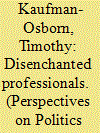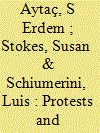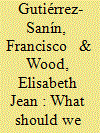|
|
|
Sort Order |
|
|
|
Items / Page
|
|
|
|
|
|
|
| Srl | Item |
| 1 |
ID:
156163


|
|
|
|
|
| Summary/Abstract |
The “corporatization” of the academy is often cited as a cause of the “de-professionalization” of the professoriate, and that in turn is cited as a cause of the faculty’s current disempowerment. The specifically modern conception of professionalism presupposed by these arguments occludes the deep implication of the academy in the generation and legitimation of specific configurations of power. This essay begins, accordingly, by elaborating this early conception of professionalism and showing how it informs twentieth century arguments on behalf of tenure, academic freedom, and the participation of faculty in institutional governance. The explicitly political reading of professionalism I offer as an alternative better explains how the academic workforce in recent decades has been thoroughly reconfigured in accordance with neoliberal imperatives. The downside of this reading, however, is that it deprives us of the justification for tenure, academic freedom, and shared governance that rested on an apolitical representation of the professoriate. I close, therefore, by asking what we stand to lose if we relinquish this ideal, but I then ask what costs we are likely to incur if we cling to a notion that compromises our ability to grasp the faculty’s current situation.
|
|
|
|
|
|
|
|
|
|
|
|
|
|
|
|
| 2 |
ID:
156160


|
|
|
|
|
| Summary/Abstract |
Under what conditions can parties use social-service provision to generate political support? And what is the causal mechanism connecting social-service provision to citizen mobilization? I argue that service provision conveys to voters a politically valuable image of the provider organization’s competence and probity, which is particularly valuable when information about parties and platforms is contradictory or poor. Support comes from an in-depth investigation into the medical networks of the Egyptian Muslim Brotherhood. I combine qualitative evidence, including fieldwork and interviews with Brotherhood social-service providers, with an original 2,483-person survey experiment of Egyptians. Respondents exposed to factual information about the Brotherhood’s medical provision are significantly more likely to consider voting for the Brotherhood in elections. A causal mediation analysis, as well as qualitative evidence drawn from the survey instrument itself, supports the hypothesized mechanism by which respondents map the Brotherhood’s compassion and professionalism in the provision of medical services onto their views of Brotherhood candidates for elected office. Beyond adding to a growing comparative-politics literature on the politics of non-state social service provision, I identify why Egypt’s current rulers have expended such effort to uproot the Muslim Brotherhood’s nationwide network of social services.
|
|
|
|
|
|
|
|
|
|
|
|
|
|
|
|
| 3 |
ID:
156161


|
|
|
|
|
| Summary/Abstract |
Elected governments sometimes deal with protests by authorizing the police to use less-lethal tools of repression: water cannons, tear gas, rubber bullets, and the like. When these tactics fail to end protests and instead spark larger, backlash movements, some governments reduce the level of violence but others increase it, causing widespread injuries and loss of life. We study three recent cases of governments in new democracies facing backlash movements. Their decision to scale up or scale back police repression reflected the governments’ levels of electoral security. Secure governments with relatively unmovable majorities behind them feel freer to apply harsh measures. Less secure governments, those with volatile electoral support, contemplate that their hold on power might weaken should they inflict very harsh treatment on protesters; they have strong incentives to back down. Our original survey research and interviews with civilian authorities, police officials, and protest organizers in Turkey, Brazil, and Ukraine allow us to evaluate this explanation as well as a number of rival accounts. Our findings imply that elected governments that rest on very stable bases of support may be tempted to deploy tactics more commonly associated with authoritarian politics.
|
|
|
|
|
|
|
|
|
|
|
|
|
|
|
|
| 4 |
ID:
156162


|
|
|
|
|
| Summary/Abstract |
Scholarship on states’ responses to international norms has focused on commitment, compliance, and noncompliance; paying insufficient attention to responses that fall outside these categories. Beyond simply complying with or violating a norm; states contest, resist, and respond to international norms in a range of ways. I identify rhetorical adaptation as a central form of resistance to international norms. Rather than simply rejecting a norm or charges of norm violation, such a strategy draws on a norm’s content to resist pressures for compliance or minimize perceptions of violation. Theorizing the relationship between norms’ content and states’ resistant rhetoric, I identify four types of rhetorical adaptation: norm disregard, norm avoidance, norm interpretation, and norm signaling. To probe the plausibility of these propositions, a case study of Turkey’s post-World War II narrative of the Armenian Genocide traces a sequence of rhetorical adaptations over the past six decades. Building on the case study, I then draw out generalizable insights into the uses and effects of rhetorical adaptation. Connecting theoretical concerns in political science with the interdisciplinary fields of genocide studies and memory studies, I delineate the ways in which actors instrumentally use norms and expand understandings of the forms and effects of so-called norm takers’ agency.
|
|
|
|
|
|
|
|
|
|
|
|
|
|
|
|
| 5 |
ID:
156159


|
|
|
|
|
| Summary/Abstract |
To leverage the full range of observed variation in patterns of violence toward the development and testing of theories of political violence, scholars need adequate conceptual foundations: what should we mean by a pattern of violence on the part of an armed organization? Scholars often distinguish degrees or levels or types of violence across organizations and conflicts, but definitions and measures vary sharply. We argue that patterns of violence are not reducible in ways often assumed in the literature: lethal violence is not a good proxy for the overall pattern, and differences in patterns are not well captured in the binary “terror” versus “restraint.” To address these concerns, we provide a new conceptualization of political violence, defining an organization’s pattern of violence as the configuration of repertoire, targeting, frequency, and technique in which it regularly engages. This approach adds precision to the documentation and analysis of political violence, clarifies the evaluation of rival theories, and opens up new research questions. We demonstrate its utility through an analysis of violence against civilians in Colombia, drawing on an original database of massacres, judicial proceedings, and other sources, and show that the concept of “pattern” helps bring ideology and politics back into the analysis of organized violence.
|
|
|
|
|
|
|
|
|
|
|
|
|
|
|
|
|
|
|
|
|